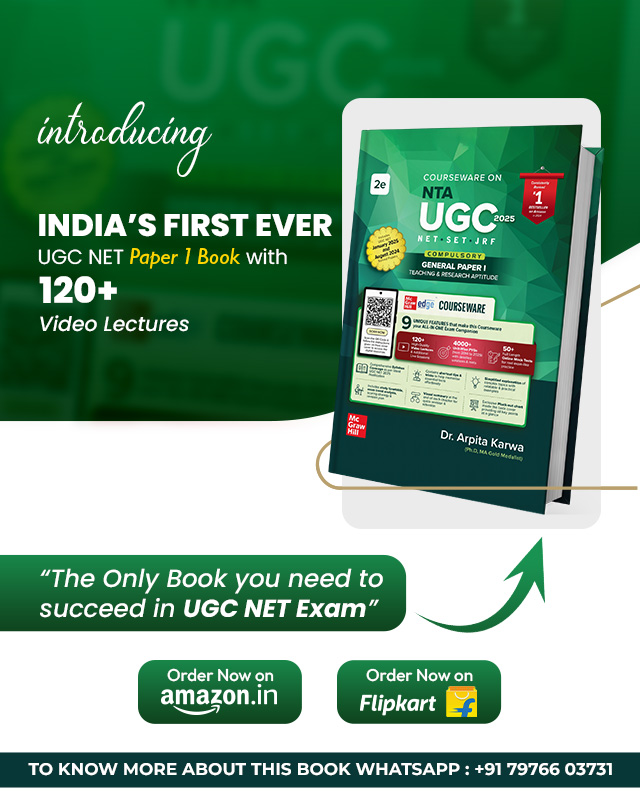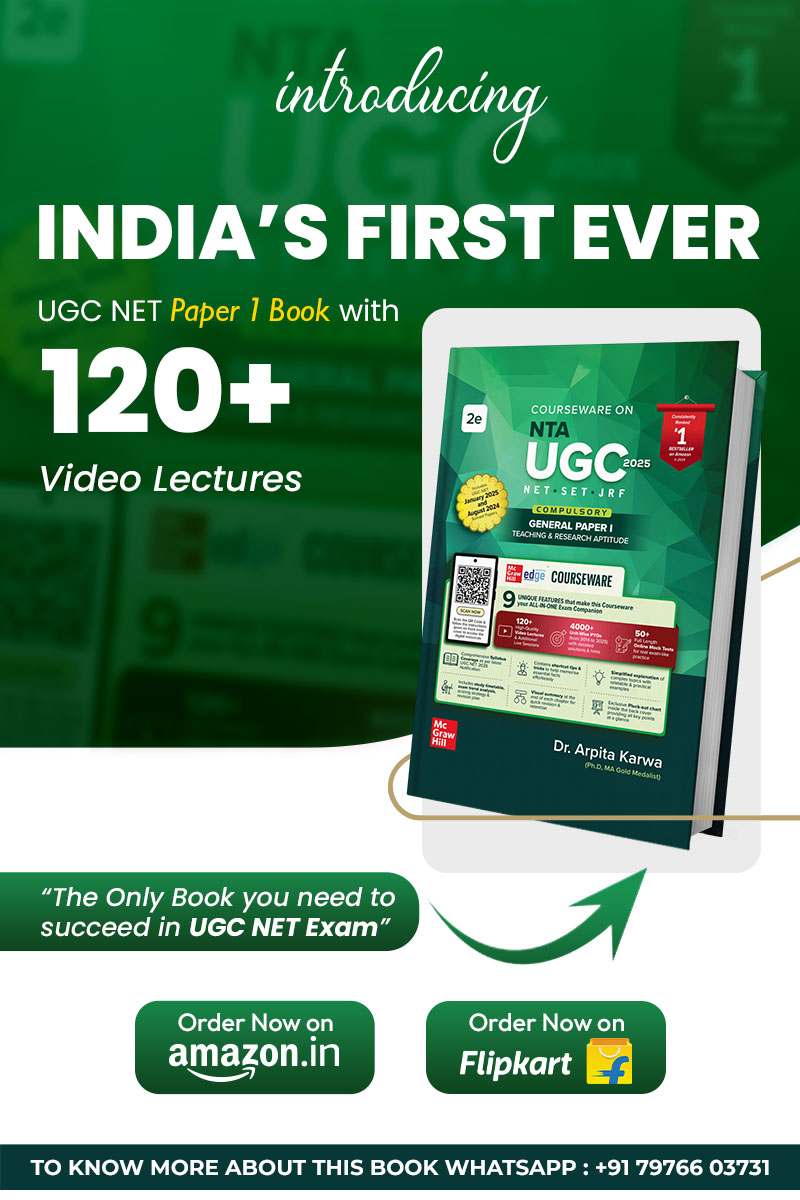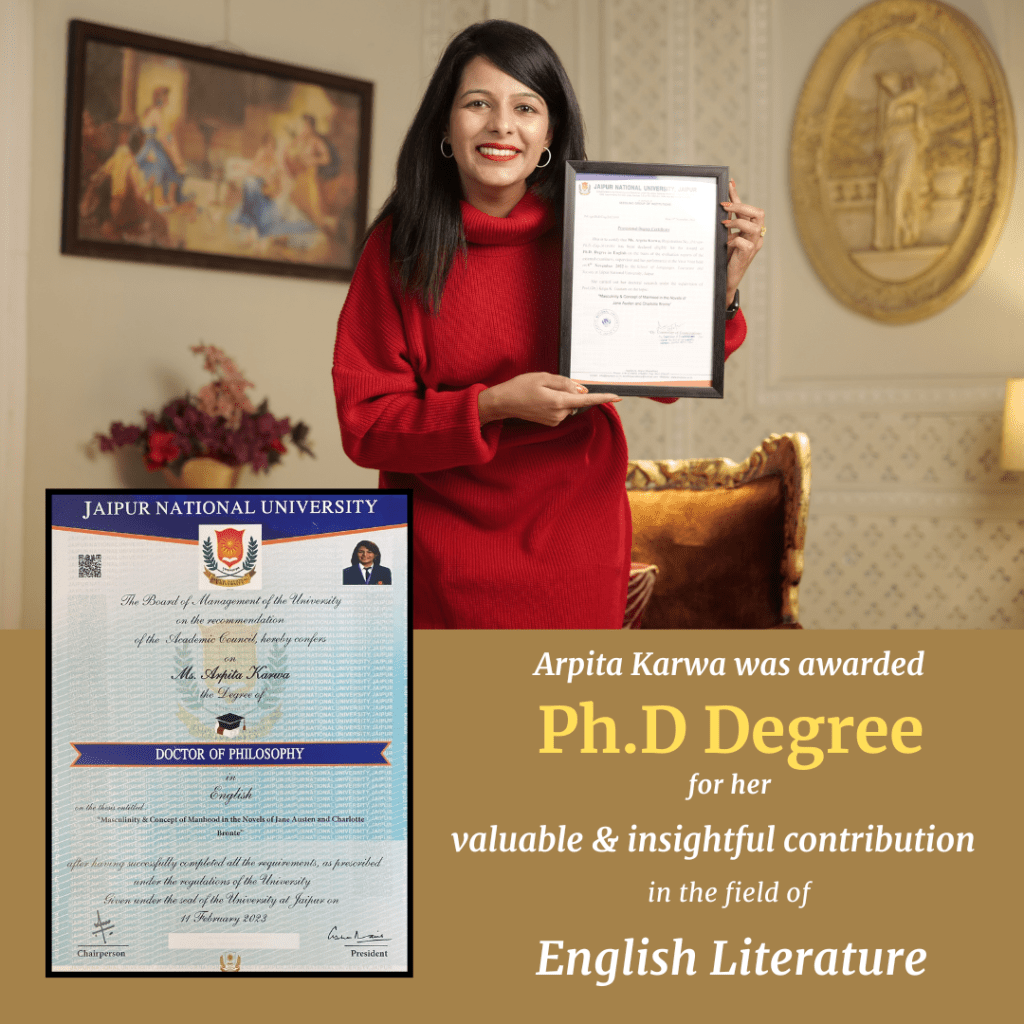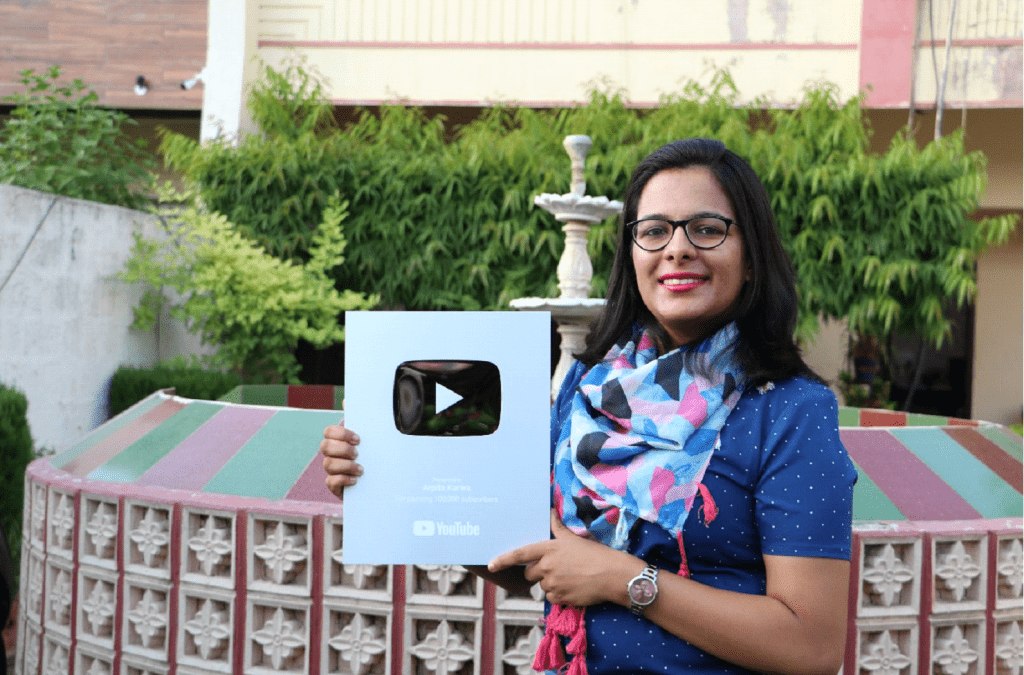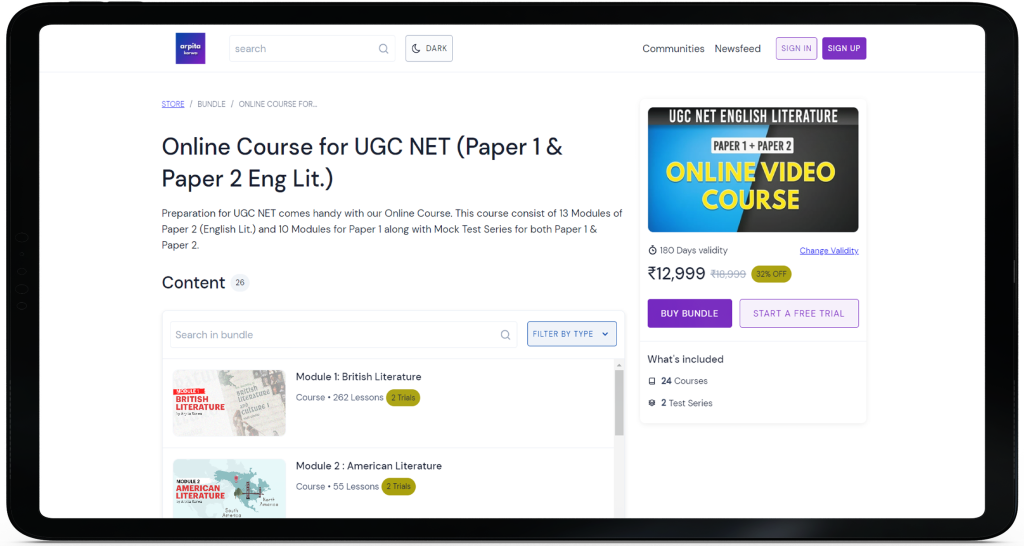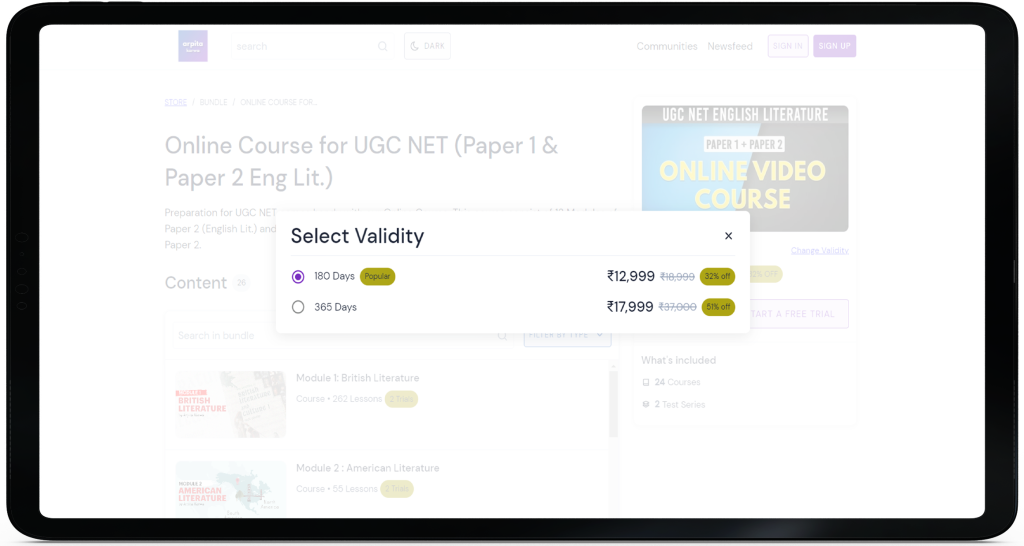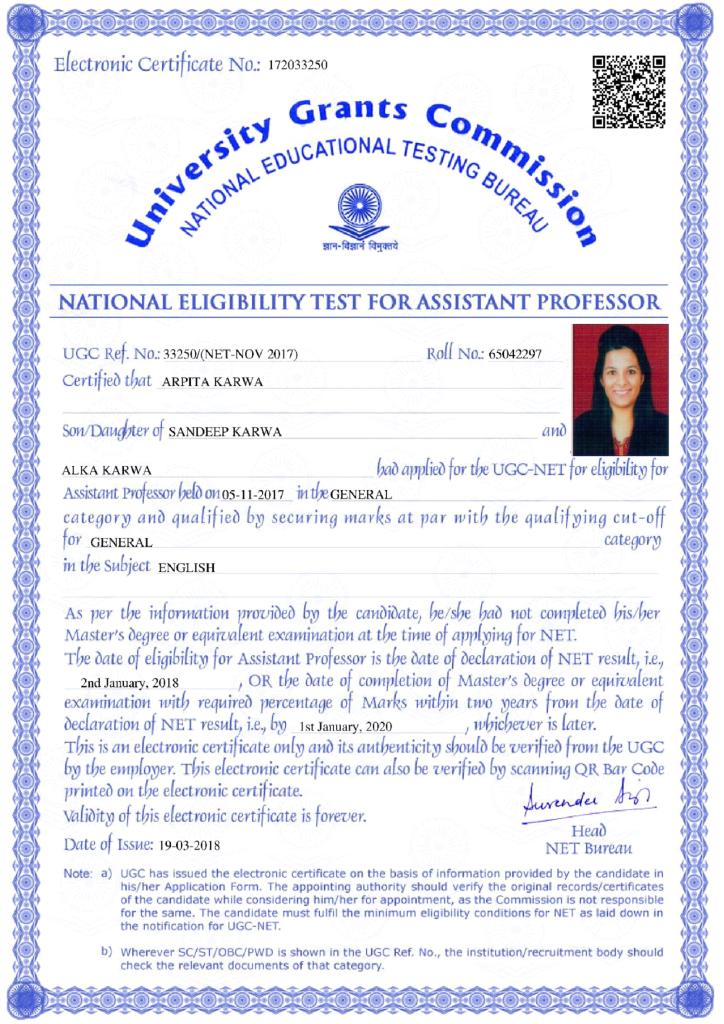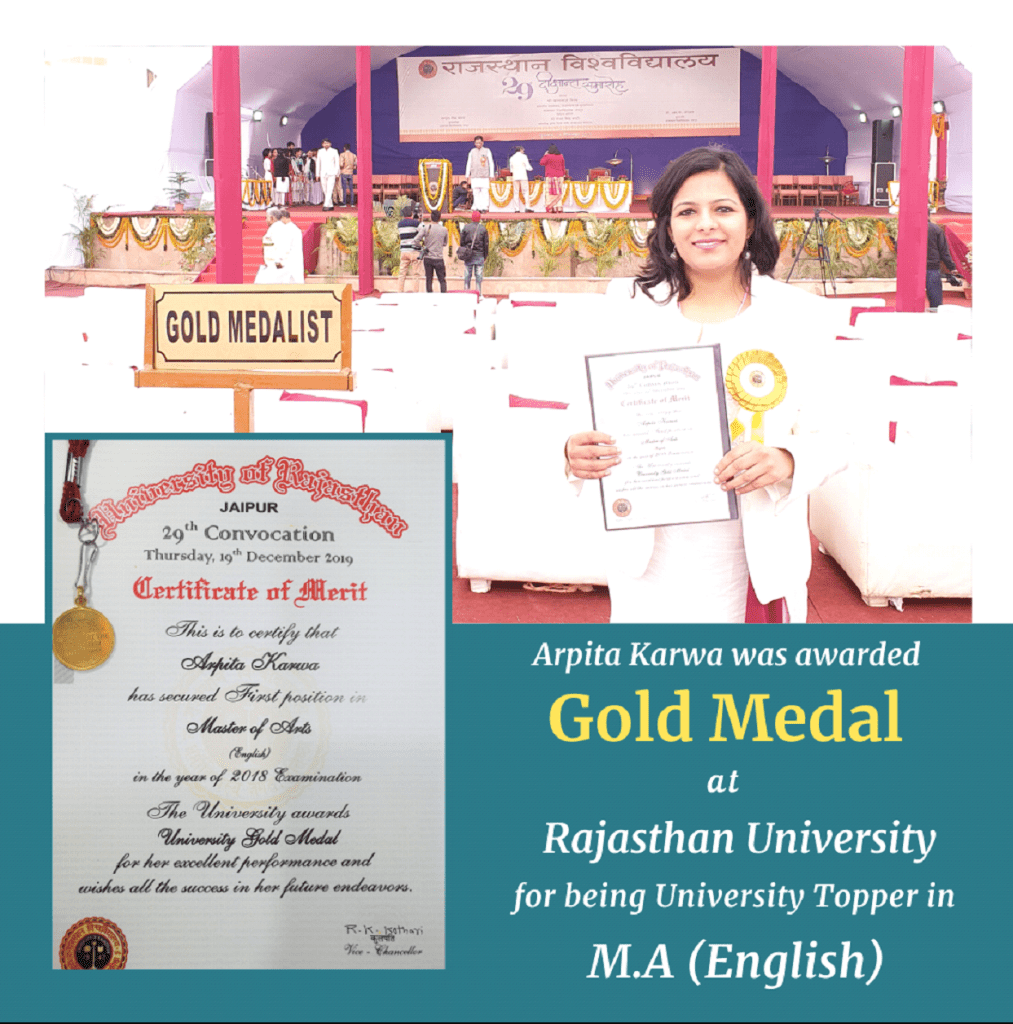West Bengal Set 4
June 20, 2023 2023-12-18 16:18West Bengal Set 4
West Bengal Set 4
Q.1) Which of the following is the proper sequence, for writing a dissertation?
(a) Write a preliminary draft
(b) Develop a thesis statement.
(c) State your purpose in writing a paper
(d) Make an outline to help you keep to your plan as you write
(A) a, b, c, d
(B) c, b, d, a
(C) d, a, b, c
(D) b, d, a, c
Q.2) Which of the following belongs to the category of good “research ethics”””)
(A) Publishing the same paper in two research journals without telling the editors
(B) Conducting a review of the literature that acknowledges the contributions of other people in the relevant field
(C) Including a colleague as an author on a research paper in return for a favour even though the colleague did not make a serious contribution to the paper
(D) Copying texts from published sources without giving credit to those who produced the sources
Q.3) Proquest is a
(A) Book
(B) Text database
(C) Search engine
(D) Online journal
Q.4) Which of the following best describes the phrase “data abuse protocols” in literary research?
1. Plagiarism
2. Translating without permission
3. Non-payment of copyright dues
4. Quoting without acknowledgement
Ans:
(A) 1 and 2 are correct
(B) 1, 2 and 3 are correct
(C) 1, 2 and 3 are incorrect
(D) 1 and 4 are correct and the rest are incorrect
Q.5) The census carried out by the Government of India is an example of
(A) Exploratory research
(B) Causal research
(C) Descriptive research
(D) Hermeneutic research
Q.6) identify the incorrect statement:
(A) A hypothesis is made on the basis of limited evidence as a starting point for further investigations
(B) A hypothesis is a basis for reasoning without any assumption of its truth.
(C) A hypothesis is a proposed explanation for a phenomenon.
(D) Scientific hypothesis is a scientific theory.
Q.7) A work can become modern only if it is first postmodern”. This line is from:
(A) “Answering the question: What is the Postmodern?” Jean-Francois Lyotard
(B) The Death of the Author by Roland Barthes
(C) “What is an Author?” by Michel Foucault
(D) Postmodernism, or, the Cultural Logic of Late Capitalism’ by Fredric Jameson
Q.8) Which of the following novelists does not show fictionality of the text?
(A) John Fowles
(B) Kurt V onnegut
(C) Laurence Sterne
(D) George Meredith
Q.9) Which of the following American novels was used by Edward Said to illustrate American Imperialism?
(A) The Last of the Mohicans
(B) The Old Man and the Sea
(C) Beloved
(D) Moby Dick
Q.10) Who links literary genres to seasons?
(A) Northrop Frye
(B) Richard Chase
(C) Maud Bodkin
(D) Francis Fergusson
Q.11) Which of the following is not a book by Stephen Greenblatt?
(A) Will in the world
(B) Hamlet in Purgatory
(C) Beginnings
(D) Marvellous Possessions
Q.12) Camera Lucida is a book by
(A) Roland Barthes
(B) John Berger
(C) Laura Mulvey
(D) Jacques Derrida
Q.13) “It is about time that criticism and philosophy acknowledged the disappearance or the death of the author”. Which critic is credited with the statement?
(A) Jacques Lacan
(B) Michel Foucult
(C) Harold Bloom
(D) Jacques Derrida
Q.14) Match the writers in List I with their ideas in List II.
List 1
(1) Raymond Williams
(2) J.L. Austin
(3) Michel Foucault
(4) Mikhail Bakhtin
List II
(A) Speech-act Theory
(B) Dialogism
(C) Marxism
(D) Post structuralism
Choose the correct option
A. (1)-a, (2)-b, (3)-b, (4)-d
B. (1)-c, (2)-a, (3)-d, (4)-b
C. (1)-d, (2)-c, (3)-b, (4)-a
D. (1)-c, (2)-d, (3)-b, (4)-a
Q.15) Bracketing is a term used in phenomenological criticism to describe
(A) Meeting of the writer’s world and the reader’s world.
(B) Meeting of the writer’s world and the Publisher’s world.
(C) Meeting of the writer’s language and the reader’s language.
(D) Meeting of the writer’s world and the world of the writer’s inner self.
Q.16) in which of her books does Julia Kristeva introduce the idea of the “abject”?
(A) Powers of Horror
(B) Desire in Language
(C) Revolution in Poetic Language
(D) The Abject and the Horrible
Q.17) New Historicism was fundamentally influenced by
(A) Marx
(B) Henri LeFebvre
(C) Derrida
(D) Foucault
Q.18) With which theoretical movement can one’ associate the idea that a work of an should ideally be marked by distancing and estrangement rather than by cohesion and progression?
(A) Post-colonialism
(B) The Frankfurt School
(C) queer Theory
(D) Post-feminism
Q.19) Which of the following books offers an argument diametrically opposed to T.S. Eliot’s “Tradition and the Individual Talent”
(A) Geoffrey Hartmann, Saving the Text: Literature/Derrida/Philosophy
(B) Harold Bloom, The Anxiety of Influence
(C) Paul de Man, Blindness and Insight
(D) Mikhail Bakhtin, The Dialogic Imagination
Q.20) Longinus On the Sublime begins with an attack on the incompleteness of the work of a Greek rhetorician called
(A) Anaximenes
(B) Demosthenes
(C) Isocrates
(D) Caecilius
Q.21) Which of the following nineteenth century litterateurs was the strongest proponent of the “high culture mass culture dichotomy that was finally erased by post-modernism?
(A) Thomas Carlyle
(B) John Ruskin
(C) Matthew Arnold
(D) Cardinal Newman
Q.22) Aristotle in his Poetics mentions three painters one of whom represents characters above the average. Identify the painter:
(A) Pausanias
(B) Polygnotus
(C) Dionysius
(D) Apollodorus
Q.23) In Tradition and the Individual Talent Eliot speaks about the working of the poet’s mind in terms of which of the following modalities?
(A) Natural selection
(B) A chemical reaction
(C) A flowing river
(D) A cornucopia
Q.24) Horace in Ars Poetica states: “Poets have ever had equal authority for attempting anything. but not to such a degree. Choose the correct explanation of Horace’s statement.
(A) Horace defends creative liberty.
(B) Horace defends creative imagination.
(C) Horace defends poetic authority
(D) Horace initiates a debate on decorum and poetic license
Q.25) The Fugitives and The Agrarians are linked to
(A) New Criticism at Yale University
(B) New Criticism at Vanderbilt University
(C) Chicago Aristotelians and New Criticism
(D) New Historicism at Berkeley
Q.26) Mark Schorer in his Technique as Discovery considers art as different from life because art carries the stamp of
(A) Objectivity, universality, dramatization and evaluation
(B) Impersonality, technique, discovery and evaluation
(C) Objectivity, impersonality, resonance and dramatization
(D) Objectivity, paradox, irony and displacement
Q.27) In his Poetics, Aristotle says: “The tragedies of most of the moderns are Characterless. What does Aristotle mean by “Character”
(A) Neutrality of dramatic character
(B) Character with a moral purpose
(C) Characters below the average
(D) Characters devoid of virtue
Q.28) Which of these is not a contemporary theory of popular culture
(A) Thing theory
(B) String Theory
(C) Rubbish Theory
(D) Actor-Network Theory
Q.29) Longinus thinks that the Sublime “consists in a certain loftiness and excellence of language” Longinian “excellence of language” refers to
(A) Judgement and reason
(B) Rhetorical skill in invention
(C) Appropriateness of language
(D) Structural craftsmanship
Q.30) The following quotation is from the Prologue of a play.
would you know the reason why I’m crying?
The comic Muse, long sick, is now a dying!
And if she goes, my tears will never stop,
Identify the play:
(A) Sheridan’s Rivals
(B) Goldsmith’s, She Stoops to Conquer
(C) Etherege’s The Man of Mode
(D) Congreve’s The Country Wife
Q.31) Under which of the following disciplines would a style of dressing be placed?
(A) Semiology
(B) Symbology
(C) Semiotics
Q.32) In which language did Namdeo Dhasal originally write?
(A) Sindhi
(B) Marathi
(C) Gujarati
(D) Odia
Q.33) Which of the following is originally composed as a graphic novel?
(A) Susan Sontag’s The Volcano Lover
(B) Marjane Satrapi’s Persepolis
(C) E.L. Doctorow’s Ragtime
(D) Ishmael Reed’s Flight to Canada
Q.34) The flim “Apocalypse Now” is an adaptation of
(A) Leo Tolstoy’s War and Peace
(B) Norman Mailer’s The Naked and the Dead
(C) Joseph Heller’s Catch-22
(D) Joseph Conrad’s Heart of Darkness
Q.35) The 2016 Hindi romantic film Fitoor is an adaptation of
(A) David Copperfield
(B) Jane Eyre
(C) Great Expectations
(D) The Moonstone
Q.36) The 1979 film Junoon is based on
(A) Ruskin Bond’s 4 Flight of Pigeons
(B) Anita Desai’s Fire on the Mountain
(C) Jane Austen’s Pride and Prejudice
(D) Charlotte Bronte’s Villette
Q.37) Which of these novelists was acknowledged by Salman Rushdie as his precursor in the use of “Chutnification of Indian English?
(A) Bhabani Bhattacharya
(B) Monohar Mulaonkar
(C) G. V. Desani
(D) Tabish Khair
Q.38) Jonson’s comedies mostly deal with his favourite theme of human greed. Which of the comedies listed below is an exception? S
(A) Volpone
(B) Epicoene
(C) The Alchemist
(D) The Case is Altered
Q.39) Which of the following are characteristics of “Butler English”?
(a) It has an object-verb-subject word order
(b) Deletion of verb inflections
(c) Deletion of prepositions
(d) The use of -ing forms for participles
Answer:
(A) a, b, c
(B) b, c
(C) b, c, d
(D) a, d
Q.40) The first National Policy on Education was adopted in the Indian Parliament in
(A) 1965
(B) 1966
(C) 1967
(D) 1968
Q.41) How did R. K. Narayan describes the kind of Indian English he wrote?
(A) As ‘brown English
(B) As toasted English
(C) As tanned English
(D) As Inglish
Q.42) Here are four aspects of the Indian psyche that do not translate very easily into English
(1) Culturally inflected thought processes
(2) Language, especially idioms
(3) Style, or manner of speaking
(4) Humour Raja Rao mentions three of these qualities in the Preface to Kanthapura as being difficult to render into English. Pick the correct combination from the options given below.
(A) 1, and 4 are correct
(B) 1, 3 and 4 are correct
(C) 1, 2 and 3 are correct
(D) 2, 3 and 4 are correct
Q.43) who wrote a seminal treatise on Dalit aesthetics, covering also the imagery and idioms appropriate for conveying the Dalit experience?
(A) Arjun Dangle
(B) Sharankumar Limbale
(C) Kancha Ilaiah
(D) Sharmila Rege
Q.44) Which are the only two states in India that still use English as their only official language?
(A) Manipur and Mizoram
(B) Pondicherry and Sikkim
(C) Meghalaya and Nagaland
(D) Arunachal Pradesh and Nagaland
Q.45) But ah, but 0 thou terrible. why wouldst thou rude on me
The wring world right foot rock? Lay a longtime against me? scan
With darksome devouring eyes my bruised bones?
Perhaps this may be the sonnet written in blood about a struggle raw in its blood and bone about which Hopkins wrote to Robert Browning in 1885. Which sonnet is this?
(A) Felix Randal
(B) Pied Beauty
(C) Carrion Comfort
(D) Prospice
Q.46) Match List I with List 1 List 2 according to the code given below:
List I
(a) The Ecstasy
(b) The Sun Rising”
(c) To His Coy Mistress
(d) The Good Morrow
List II
(1) For God’s sake hold your tongue and let me love
(2) When love, with one another so Interinanimates two souls That abler soul, which thence doth flow, Defects of loneliness contral
(3) My face in thine eyes, thine in mine appears And true plain hearts do in the faces rest
(4) My vegetable love should grow Vaster than empires and slower. An hundred years should go to praise Thine eyes, and on thy forehead gaze
(A) (a)-1, (b)-2, (c)-3, (d)-4
(B) (a)-2, (b)-1, (c)-4, (d)-3
(C) (a)-3, (b)-4, (c)-2, (d)-2
(D) (a)-1, (b)-3, (c)-4, (d)-1
Q.47) In Language Learning Monitor Model Hypothesis is attributed to
(A) Stephen Krashen
(B) BF Skinner
(C) Jean Piaget
(D) Noam Chomsky
Q.48) According to which linguistic process did Latin pedem become English “foot” and Latin “centum’ change to English “hundred’?
(A) Grimm’s Law
(B) Verner’s Law
(C) Kluge’s Law
(D) The Great Vowel Shift
Q.49) According to Verner’s Law the voiceless consonants “p. T and k changed to the voiced consonants “b”, “d’ and ‘g’ when they came after
(A) A stressed syllable
(B) An unstressed syllable
(C) A caesura
(D) A diphthong
Q.50) When the Great Vowel Shift took place in the English language the vowels “I” and “u” changed, to
(A) ‘ol’ and ‘ou’
(B) “ai” and “au”
(C) “ei” and “eu”
(D) “aei” and “aeu
Q.51) Match the plays in List A with their authors in List B
List A
(a) Bussy D’ Ambois
(b) Antonio and Mellida
(c) Women Beware Women
(d) The Revengers Tragedie
List B
(1) Thomas Middleton
(2) Cyril Tourneur
(3) George Chapman
(4) John Marston
A. (a)-3, (b)-2, (c)-1, (d)-4
B. (a)-3, (b)-4, (c)-2, (d)-4
C. (a)-2, (b)-4, (c)-3, (d)-1
D. (a)-3, (b)-4, (c)-1, (d)-2
Q.52) Which of the following sentences is not a tautology?
(A) There is a lot of frozen ice on the road.
(B) The market was in close proximity to the bomb blast.
(C) The hotel room wasn’t great but it was adequate.
(D) Having a fitness test is a necessary requirement for the job.
Q.53) Which of the following is not correct?
(A) Syllable is a part of a word which generally has only vowel sound.
(B) Syllable is a part of a word which can never have one silent vowel letter.
(C) Syllable is a part of a word which can also have a syllabic consonant.
(D) Syllable can be a meaningful word by itself.
Q.54) Who said “Good Prose is like a window pane
(A) Aldous Huxley
(B) George Orwell
(C) E.M. Forster
(D) Robert Lynd
Q.55) Match the autobiographies in List I with their authors in List II.
LIST 1
(a) Going Home
(b) Joseph Anton
(c) Up From Slavery
(d) Chronicles
LIST 2
(1) Salman Rushdie
(2) Booker T Washington
(3) Bob Dylan
(4) Doris Lessing
A. (a)-3, (b)-4, (c)-2, (d)-1
B. (a)-4, (b)-1, (c)-2, (d)-3
C. (a)-1, (b)-3, (c)-4, (d)-2
D. (a)-2, (b)-4, (c)-1, (d)-3
Q.56) Who, and in which document, sought.to change the people of India in the following manner: “a class of persons Indian in blood and color but English in taste, in opinion, in morals, and in intellect [who] may be interpreters between us and the millions whom we govern”?
(A) Lord Minto in the Minto-Morley Reforms (1909)
(B) Lord Cornwallis and the Permanent Settlement Act (1793)
(C) Lord Macaulay and the Minute on Indian Education (1835)
(D) The Charles Act on Indian Education (1813)
Q.57) Given below are two statements, one marked Assertion (A) and the other marked Reason (R), Study them and choose the correct option below Assertion (A). The essay is a literary form that is always subjective or personal. Reason (R). This is because it is not possible to develop an argument within such a brief space
(A) A is correct but R is incorrect
(B) A is incorrect but R is correct
(C) Both A and R are correct
(D) Both A and Rare incorrect
Q.58) Which of the following characteristics is not true of the emerging mode of prose poetry”?
(A) It is written in paragraphs and not verses
(B) It uses images and figures speech
(C) It uses rhythm but not thyme
(D) It is expository and not emotive
Q.59) Here is a statement followed by two assumptions.
With respect to the assumptions choose the correct option below.
Statement:
An autobiography focuses on the sequence of events of the writer’s life up to the point of writing while a memoir covers certain aspects of a writer’s life.
Assumptions:(1) The above statement suggests that an autobiography is chronologically ordered while a memoir is not necessarily so.
(2) The above statement suggests that an autobiography is written in the first person while a memoir is written in the third person.
(A) (1) is correct and (2) is incorrect
(B) (1) is incorrect and (2) is correct
(C) Both (2) and (1) are correct
(D) Both (1) and (2) are incorrect
Q.60) Here are some of the opening lines from Bertolt Brecht’s The Messingkauf Dialogues:
A stage on which the Stagehand is slowly dismantling the set. An Actor, a Dramaturge and a Philosopher are sitting on chairs……. The Actor pours the wine into glasses and hands it round.
THE ACTOR. All this dust makes it thirsty work sitting on a stage. You’d better take a good swig.
Choose the correct option from the ones given below:
(A) The above passage is an example of diegesis
(B) The above passage is an example of mimesis
(C) The above passage is a blend of diegesis and mimesis.
(D) The above passage illustrates neither diegesis nor mimesis.
Q.61) Which was the first book of essays to be published?
(A) Bacon’s Essays
(B) La Rochefoucauld’s Maxin
(C) Montaigne’s Essais
(D) Pico della Mirandola’s On the Dignity of Man
Q.62) Which of the following is not a detective character?
(A) Father Brown
(B) Reginal Wexford
(C) Anne Catherick
(D) Mike Hooligan
Q.63) Match the authors with their work.
A: –
(1) Chitra Banerjee Divakaruni
(2) Bharati Mukherjee
(3) Hari Kunzru
(4) Sunetra Gupta
B: –
(A) Memories of Rain
(B) The Tree Bride
(C) The Forest of Enchantment
(D) Memory Palace
A. (1)-a, (2)-c, (3)-b, (4)-d
B. (1)-d, (2)-b, (3)-c, (4)-a
C. (1)-b, (2)-c, (3)-d, (4)-a
D. (1)-c, (2)-b, (3)-d, (4)-a
Q.64) It was said that Uncle Tom’s Cabin was “the book which started the great war………Which is the great war” referred to?
(A) The American War of Independence
(B) The Spanish-American War
(C) The American Civil War
(D) The Mexican-American War
Q.65) The works of Franz Kafka were originally written in
(A) French
(B) German English
(C) Czech
(D) English
Q.66) Which major novelist was not included by F.R. Leavis in his The Great Tradition
(A) Jane Austen
(B) Joseph Conrad
(C) Henry James
(D) Charles Dickens
Q.67) Robinson Crusoe lived in an uninhabited island for
(A) Twentyeight years
(B) Twentysix years
(C) Thirteen years
(D) Thirtyseven years
Q.68) Eliza Anne Fraser (C. 1798-1858) was a Scottish woman who was abroad a ship that wrecked at an island off the coast of Q.ueensland, Australia, on 22 May 1836, and who was taken by the Badtjala (Butchella) people, Which novel by Patrick White adapts her story”
(A) Memoirs of Many in One
(B) A Fringe of Leaves
(C) Eye of the Storm
(D) The Aunt’s Story
Q.69) Match the novelists named in List with their novels given in List II from the codes given below:
List 1
(a) Margaret Laurence
(b) Rohinton Mistry
(c) Margaret Atwood
(d) Michael Ondaatje
List 2
(1) Cat’s Eye
(2) The Diviners
(3) Warlight
(4) Such a Long Journey
ANS:-
(A) (a)-1, (b)-3 (c)-4, (d)-2
(B) (a)-2, (b)-4, (c)-1 (d)-3
(C) (a)-3, (b)-2, (c)-4, (d)-1
(D) (a)-2, (b)-3 (c)-1, (d)-4
Q.70) Peter Carey’s Jack Maggs is a re-working of Dicken’s Great Expectations. But Carey also re invents Dickens as a young writer called
(A) Henry Phipps
(B) Tobias Oates
(C) Percy Buckle
(D) Mercy Larkin
Q.71) Which of the following cannot be called a “Bildungsroman
(A)Charles Dickens’s David Copperfield
(B) Henry Fielding’s Tom Janer
(C) James Joyce’s A Portrait of the Artist as a Young Mu
(D) Daniel Defoe’s Robinson Crusoe
Q.72) The Africans in Heart of Darkness are viewed as
(a) They are seen as servile black men.
(b) They are viewed as “enemies’
(c) They are presented as ‘rebels’ by Kurtz.
(d) Soon the enemies’ become ‘criminals in the eyes of the Whites
Give the right sequence of these statements as they appear in the novel:
(A) – (a), (b), (c), (d)
(B) – (b), (a), (d), (c)
(C) – (a), (b), (d), (c)
(D) – (c), (a), (b), (d)
Q.73) Match the following books in List I with their settings in List II: List 1
List I
(a) Christopher Isnerwood’s Mr. Norris Changes Trains
(b) By Evelyn Waugh’s Vile Bodies
(c) George Orwell’s The Road to Wigan Pier
(d) dy Graham Greene’s The Heart of the Matter
List 2
(1) Lancashire and Yorkshire
(2) Berlin
(3) London
(4) Sierra Leone
Codes:
A. (a)-1, (b)-3, (c)-2, (d)-4
B. (a)-4, (b)-3, (c)-1, (d)-2
C. (a)-2, (b)-3, (c)-1, (d)-4
D. (a)-3, (b)-2, (c)-4, (d)-1
Q.74) Then I noticed a small sketch in oils, on a panel, representing a woman, draped and blindfolded carrying a lighted torch. The passage occurs in
(A) Nostromo
(B) Lord Jim
(C) Heart of Darkness
(D) Victory
Q.75) Why were Scott’s novels called Waverley Novels?
(A) Because most of them were set in the region called Waverley
(B) Because they were named after “Waverley’ the first of the series of historical novels that Scott wrote
(C) Because they were later named after Waverley, the last of the historical novels that Scott wrote
(D) Because the protagonists are wavering between different decisions
Q.76) Sir Thomas Bertram tries his best to keep the distinction between himself and his children the one hand and his poor relative Fanny on the other. He says to Mrs. Norris There will be some difficulty in our way to the distinction proper to be made, between the two girls as they grow up; how to preserve in the minds of my daughters the consciousness of what they are and how without depressing her spirits too far, to make her remember that she is not Miss Bertram. Their rank, fortune, rights and expectations will always be different Austen demonstrates the complexity of Sir Thomas Bertram Which of his characteristics not depicted in the list below?
(A) Class-consciousness
(B) Sympathy for Fanny
(C) Sense of decorum
(D) Misogyny
Q.77) In T. S. Eliot’s The Waste Land, the line……..that Shakespherian Rag is
(A) Taken from a popular song by Jane Buck and Herman Ruby (1912)
(B) Taken from Tristram Shandy
(C) Taken from Shakespeare Our Contemporary by Jan Kott
(D) Taken from a Harvard University production of Shakespeare’s King Lear
Q.78) Palgrave’s Golden Treasury was published in the year
(A) 1861
(B) 1867
(C) 1865
(D) 1869
Q.79) “I saw the best minds of my generation destroyed by madness, starving hysterical naked……. Choose the correct option from the ones given below, to explain the phrase “starving hysterical naked
(A) The best minds were mad and hungry.
(B) The best minds were lacking in proper ideology and conviction
(C) The best minds were unemployed and poverty-stricken.
(D) Most of the best minds were passionate to the point of hysteria
Q.80) The first poet to have evolved the Sommet form is
(A) Giacomo da Lentini
(B) Dante Alighieri
(C) Guittone d’Arezzo
(D) Guido Cavalcanti
Q.81) As whan a man has been is poor estate.
And Climbeth up, and waxeth fortunate
And there abideth in prosperity
These lines from Chaucer’s Nun’s Priest’s Tale bears the influence of
(A) Horace’s Ars Poetica
(B) Josephus Jewish AntiQ.uities
(C) Boethius’ De Consolationde Philosophiae
(D) Strabo’s Geographica
Q.82) Which of the following characters has no mention in Milton’s Paradise Lost, Book 1?
(A) Mammon
(B) Gabriel
(C) Chemos
(D) Moloch
Q.83) Match the cities in List with lines from the poems describing these cities in List I
List 1
(a) Eliot’s London
(b) Year’s by Zantiom
(c) Plath’s San Francisco
(d) Ezra Pound’s Paris
List 2
(1) The Young In one another’s arms, bird in the trees……. Those dying generations
(2) think we are in rat’s alley Where the dead men lost their bones.
(3) The apparition of these faces in the crowd, Petals on a wet black bough
(4) Ghastly statue with one grey toe Big as a frisco seal
Codes:
A. (a)-2, (b)-4, (c)-3, (d)-1
B. (a)-1, (b)-3, (c)-2, (d)-4
C. (a)-2, (b)-1, (c)-4, (d)-3
D. (a)-1, (b)-4, (c)-3, (d)-2
Q.84) Who among the following wrote a poem giving the same title as John Donne did – “A Valediction Forbidding Mourning?
(A) Adrienne Rich
(B) Dylan Thomas
(C) Sylvia Plath
(D) Sonia Sanchez
Q.85) Thou was not born for death, immortal Bird No hungry generations tread thee down, The voice I heard this passing right was heard
In ancient days by emperor and clown.
In what sense is the Bird immortal? Given below are four statements.
Choose the correct answer.
(a) If the struggle for survival and the mad competition of modern life is concerned, both Man and Bird are eQ.ually mortal
(b) Man as an individual is wrongly compared to the bird as a species. In that sense Man’s mortality is contrasted to the bird’s immortal.
(c) If the “voice in the third line stands for the nightingale’s song unchanged from age to age, contrasted with the transient passing night, then it is inmortal
(d) The Bird is immortal in the sense that its song has been bringing joy to human beings through the ages
(A) (a) is correct
(B) (b) is correct
(C) (e) is correct
(D) (c) and (d) are correct
Q.86) In the first Canto of Homer’s Iliad Agamemnon declined to free the daughter of Chryses who afterwards invoked the god for revenge. Who is the god and does he fulfil Chryses’ prayer?
(A) Hera sent a thunderstorm
(B) Zeus caused an earthquake
(C) Apollo shot his arrows
(D) Artemis killed the Achaean any
Q.87) The first Canto of Virgil’s Aeneid begins with a great storm that destroys the fleet of Aeneas. But later the storm calms down. This natural event has been presented in terms of the battle of gods. Who are the gods involved?
(A) Jupiter. Dionysus and Apollo
(B) Minerva, Neptune and Juno
(C) Juno, Aeolus and Neptune
(D) Venus, Neptune and Aeolus
Q.88) “A bright reply to wisdom’s occult plane. A calm illuminator and flame” The lines are from
(A) Sarojini Naidu’s “The Gift of India
(B) Toru Dutt’s “Lakshman
(C) Sri Aurobindo’s The Golden Light
(D) Kamala Das’s “Ghanshyam”
Q.89) The Australian-born classical scholar Gilbert Murray is the original of Shaw’s
(A) Marchhanks in Candida
(B) Cusins in Major Barbara
(C) Professor Higgins in Pygmalion
(D) Dubedat in Doctor’s Dilemma
Q.90) Given below are two statements, one labelled as Assertion (A) and the other Reason (R)
Assertion (A): In As You Like It Ganymede faints when he sees the handkerchief covered with Orlando’s blood after he was injured by the lioness. But as soon as Ganymede recovers be tries to act as if the fainting was only a pretence – well counterfeited”.
Reason (R): Ganymede is actually Rosalynd disguised as a man with the sensibility of a woman and a tender heart Since she does not want Orlando and Oliver to suspect her she desperately tries to pass it off a pretence.
In the light of the above, indicate the correct option:
(A) Both (A) and (R) are true, and (R) is the correct explanation of a
(B) Both (A) and (R) are true, but (R) is not the correct explanation for (A)
(C) (A) is true, but (R) is false
(D) (A) is false, but (R) is true.
Q.91) “But while I have a sword, a hand, a heart I will not yield to any such upstart? Who is this upstart referred to?
(A) The Archbishop of Canterbury
(B) Gaveston
(C) Younger Mortimer
(D) The Bishop of Coventry
Q.92) Which of the modern plays by a British playwright puts Shakespeare as a character on stage?
(A) Edward Bond’s Bingo
(B) Harold Pinter’s Mountain Language
(C) Terence Rattigan’s Inspector Calls
(D) Joe Orton’s Loot
Q.93) The tragic-comedy which is the product of the English theatre is one of the most monstrous inventions that ever entered into a poet’s thought” Who said this?
(A) John Dryden
(B) Alexander Pope
(C) Joseph Addison
(D) Dr. Samuel Johnson
Q.94) Rosse called Macbeth “Bellona’s bridegroom” because
(A) Lady Macbeth was known as Bellona in Scotland.
(B) Macbeth was as valiant as Mars.
(C) Macbeth was Fortuna’s minion.
(D) Bellona was the godmother of King James I.
Q.95) Match the playwrights in List Iwith their plays in List II.
List I
(a) Manjula Padmanabhan
(b) Dina Mehta
(c) Poile Sengupta
(d) Shanta Rama Rau
List II
1. Mangalam
2. A Passage to India
3. Lights Out
4. Brides are not for Burning
Codes:
A. (a)-3, (b)-4, (c)-1, (d)-2
B. (a)-4, (b)-3, (c)-2, (d)-1
C. (a)-1, (b)-2, (c)-3, (d)-4
D. (a)-2, (b)-4, (c)-3, (d)-1
Q.96) Who coined the term “macaronic theatre”?
(A) Rustom Bhasucha
(B) Peter Brooks
(C) Marvin Carlson
(D) Erika Fischer-Lichte
Q.97) Jhumpa Lahiri’s short story When Mr. Pirzada Came to Dine’ mainly concentrates on the difference between
(A) Two generation of Indian Americans
(B) An Indian and a Bangladeshi
(C) Indians and Americans
(D) Bangalis and Punjabis
The following is an extract from a famous novel. Read it carefully and answer the Question Nos. 98, 99, 100.
An overcast September evening, just at nightfall. saw beneath its drooping eyelid Mrs. Sparsit glide out of her carriage, pass down the wooden steps of the little station into a stony road, cross it into a green lane, and become hidden in a summer growth of leaves and branches. One or two late birds sleepily chirping in their nests and a bat heavily crossing and recrossing her, and the reek of her own tread in the thick dust that felt like velvet, were all Mrs. Sparsit heard or saw until she very softly closed a gate.
She went up to the house, keeping within the shrubbery, and went it. peeping between the leaves at the lower windows. Most of them were open, as they usually were in such warm weather. but there were no lights yet, and all was silent. She tried the garden with no better effect. She thought of the wood and stole towards it heedless of long grass and briers, of worms, snails and slugs, and all the creeping things that be. With her dark eyes and her hook nose warily in advance of her. Mrs. Sparsit softly crossed her way through the thick undergrowth. so intent upon her object that she probably would have done no less, if the wood had been a wood of adders.
Q.98) Why does the September evening seem to have drooping eyelid? Choose the correct answer.
(a) Because just at nightfall the September evenings is already feeling sleepy.
(b) Because the sky is ‘overcast, it seems to have “dropping eyelid.
(c) It has ‘dropping eyelid because it is tired and indifferent, not much interested in the pursuit of Mrs. Sparsit.
(d) It is feeling sleepy because all the flora and fauna around are feeling sleepy
(A) (a) and (b) are correct
(B) (c) is incorrect
(C) (d) is correct
(D) (a), (b) and (c) are correct
Q.99) What does not show that Mrs. Sparsit is self-composed and determined?
(A) The way she moves bravely through the dark wood.
(B) She ignores all the hindrance in her way.
(C) The way she is heedless of the creepy sensations produced by the warms and slimy creatures.
(D) Only if the wood of adders- an image of danger and repugnance had been so repulsive she would have dropped her project.
Q.100) Whose point of view emerges from the passage?
(A) It is the point of view of Mrs. Sparsit.
(B) It is entirely presented through the “eyes’ of the September evening.
(C) It is presented from the point of view of Nature.
(D) It is authorial point of view.






